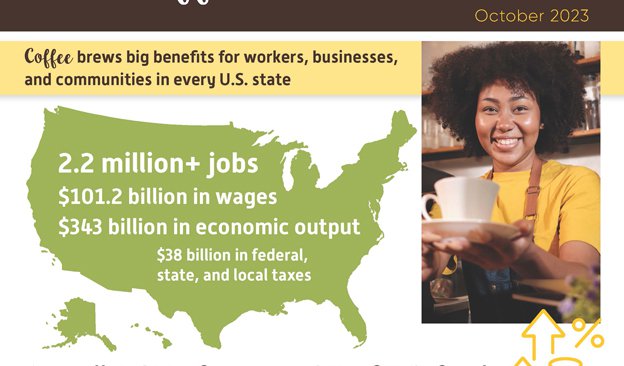




A major study conducted by the National Coffee Association (NCA) reveals the significant economic impact of coffee in the United States. According to the study, U.S. consumers spent nearly $110 billion on coffee and related goods in 2022, accounting for more than eight percent of the value of the entire foodservice industry. This spending resulted in the creation of 2.2 million jobs, $101.2 billion in wages, and $38 billion in tax receipts [1caef60f] [453092e9]. The study also emphasizes the positive impact of coffee spending on economies worldwide [1caef60f].
The NCA study provides insights into consumer behavior and preferences when it comes to coffee. It found that coffee is the favorite beverage among adults in the United States, with 63% of grownups consuming it daily. The most popular preparation method for coffee is the drip coffee maker, followed by the single-cup brewer, cold brewing, and espresso machine. Cold brew has seen a significant increase in popularity, with a 45% increase since January 2023 and a 300% increase since 2016. Additionally, 81% of American coffee drinkers have coffee with breakfast [1caef60f].
In addition to its economic impact, coffee also offers numerous health benefits. Regular consumption of coffee has been found to reduce the risk of liver cancer and Parkinson's disease. It provides relief from stress, improves brain function, and reduces the risk of Alzheimer's and dementia. Coffee can also help maintain a healthy weight by stimulating metabolism and suppressing appetite. The caffeine in coffee stimulates the nervous system and increases adrenaline levels. While regular consumption of coffee may initially increase blood pressure, it can help reduce the risk of heart disease and stroke over time [e127b698] [453092e9].
A recent study published in The Washington Post further supports the health benefits of coffee. The study used data from 10,639 subjects collected from 2007 to 2018 in the National Health and Nutrition Examination Survey (NHANES). It found that sedentary coffee drinkers had a 24 percent reduced risk of mortality compared with sedentary non-coffee drinkers. Additionally, those who drank the most coffee (more than two cups per day) showed a 33 percent reduced risk of all-cause mortality and a 54 percent reduced risk of cardiovascular disease mortality compared with non-coffee drinkers. The study also revealed that sitting more than eight hours a day was associated with a 46 percent higher risk of all-cause mortality and a 79 percent higher risk of cardiovascular disease mortality [4888b363].
The economic, consumer behavior, and health impact of coffee in the United States are undeniable. From its contribution to the economy to its potential health benefits, coffee continues to be a beloved beverage with wide-ranging effects [39eb1ac5].
In China, Yunnan Agricultural University has launched the country's first major in coffee science and engineering. The four-year undergraduate program aims to address the lack of talent and technology in the coffee industry. It covers subjects such as coffee flavor chemistry, processing, quality and safety testing, factory design, environmental protection, world coffee trade, engineering principles, and nutrition and health. The university hopes to open up the program to global internships and exchanges, recognizing the importance of international exposure in the coffee industry [7a0f49e2].
China is the 13th largest coffee producer in the world, with most of its coffee grown in Yunnan province. The introduction of the coffee science major at Yunnan Agricultural University reflects the growing interest and potential of the coffee industry in China. By offering specialized education and training in coffee science, the university aims to cultivate a new generation of coffee professionals and contribute to the development of the coffee sector in China [7a0f49e2].